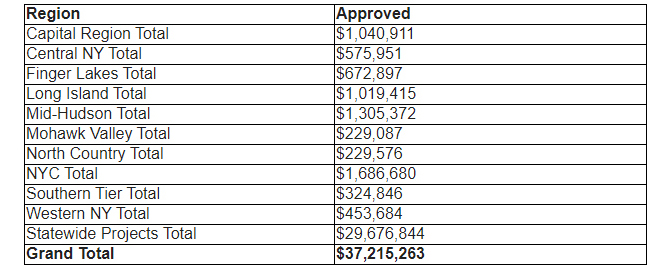Governor Cuomo Announces Over $37.2 Million Awarded to Highway Safety Initiatives Across New York
These grants provide funding to local, state and not-for-profit agencies for projects that improve overall highway safety and reduce deaths and serious injuries due to crashes. The projects awarded funding focused on three types of driver safety initiatives: highway safety, child passenger safety and police traffic services.
“The safety of our roadways is critical to communities in every corner of this great state and we’re working to avoid needless tragedies caused by dangerous and reckless driving,” Governor Cuomo said. “This funding will support critical traffic enforcement, community programs and child passenger safety initiatives that will help protect everyone on the road and make our state’s roadways safer for all.”
Department of Motor Vehicles Commissioner and GTSC Chair Mark J.F. Schroeder said, “New York is committed to improving safety on our roadways and we proudly support these critical programs, which help protect motorists, passengers and pedestrians throughout the state. This funding makes it possible for law enforcement and community groups to conduct unique and effective education and enforcement initiatives that help save lives and keep New York’s roadways as safe as possible.”
The funding, which is provided by the National Highway Traffic Safety Administration, is administered by the Governor’s Traffic Safety Committee. This year, $37.2 million was awarded to 502 projects that focused on three types of driver safety initiatives:
$32.1 Million for Highway Safety Grants
Provided to state, local and not-for-profit programs that cover a variety of traffic safety efforts including education initiatives, traffic records improvements, training, crash reconstruction, and railroad crossing safety. In addition, the programs cover distracted driving, slow moving vehicles, and drowsy and impaired driving. These initiatives focus on protecting child passengers, pedestrians, bicyclists, wheel-sport athletes, motorcyclists, teens and older drivers.
$2.6 Million for Child Passenger Safety
Supports child passenger safety education, training for child passenger safety technicians, conducting car seat checks statewide, operating a car seat distribution program for low-income families, and establishing permanent child safety seat fitting stations.
$2.5 Million for Police Traffic Services
Initiatives by law enforcement agencies to target dangerous driver behaviors. This includes participation in the national Click It or Ticket seat belt mobilization and other enforcement initiatives aimed at preventing unsafe speed, aggressive and distracted behaviors, and occupant restraint enforcement.
Senator Tim Kennedy, Chair of the Senate Transportation Committee, said, “It’s imperative that we continue to prioritize the safety of New Yorkers as they navigate our roadways, and this investment will ultimately help protect both drivers and pedestrians alike. I’m pleased to see these important education, training, and enforcement initiatives supported, and I look forward to their continued success in keeping our state’s roadways safe.”
Assembly Member William Magnarelli, Chair of the Assembly Transportation Committee, said, “This funding is critical to the localities and community organizations that help ensure our roads are safe for everyone who use them. I am grateful for the support of the National Highway Traffic Safety Administration and the Governor’s Traffic Safety Committee in educating New Yorkers and facilitating these much-needed traffic safety measures that protect my constituents and everyone who visits our community.”
A regional breakdown of the grant funding is below:

A full list of awardees is available here.
These grants build on the state’s efforts to make our roadways safer by supporting successful programs such as the Click It or Ticket enforcement campaign. According to the Institute for Traffic Safety Management and Research at the University at Albany’s Rockefeller College, New York’s seat belt compliance rate has consistently remained at or above 90 percent since 2010. In a 2019 survey, drivers and front seat passengers were observed wearing seatbelts 94 percent of the time, the highest level in state history. The national average for seatbelt compliance is 90.7 percent, according to the National Highway Traffic Safety Administration (NHTSA).
